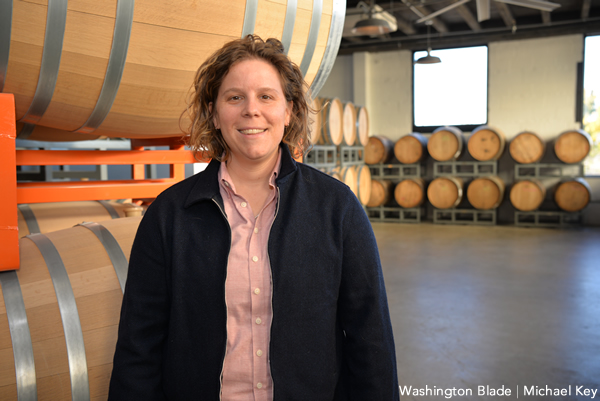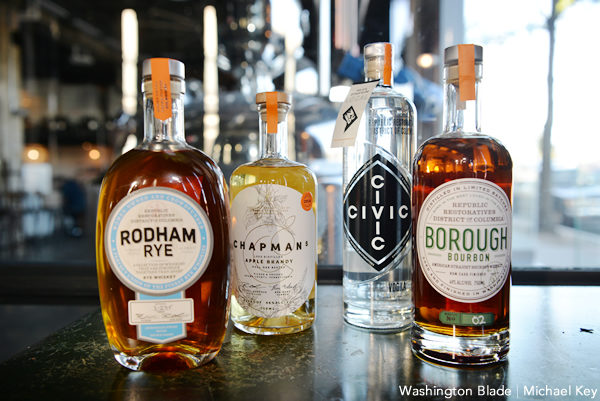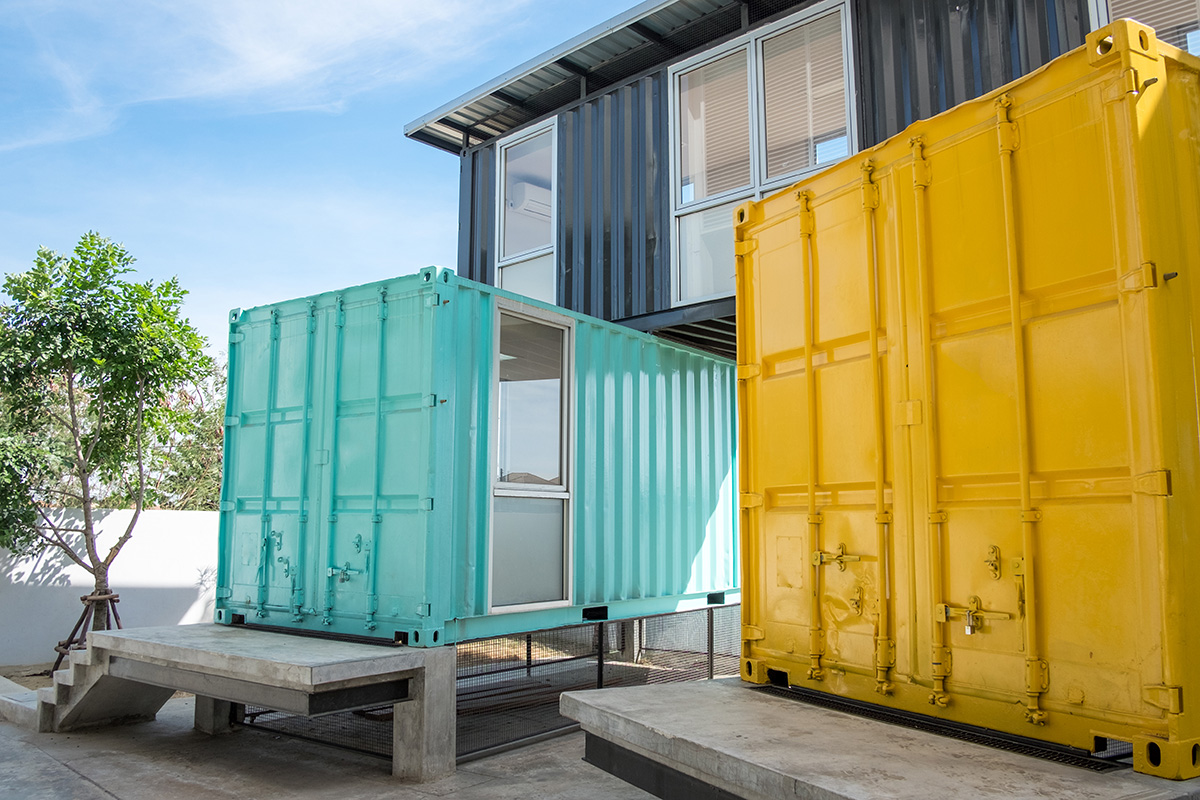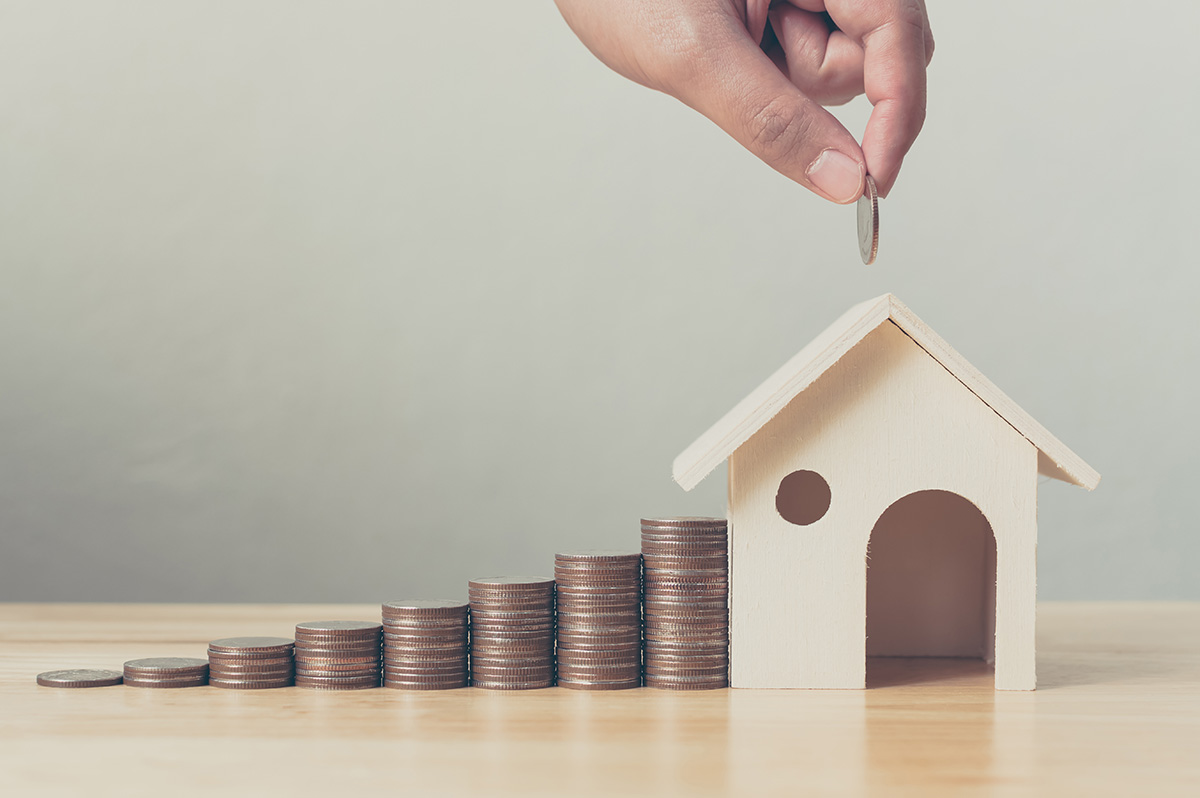Financial
D.C.’s first woman-owned distillery an entrepreneurial dream come true
Leaving gov’t work behind, local lesbians find passion in Republic Restoratives


Pia Carusone and Rachel Gardner founded Republic Restoratives Distillery in May 2016. (Washington Blade photo by Michael Key)
Friends from childhood, launching Republic Restoratives Distillery in May 2016 provided lesbian co-founders Pia Carusone and Rachel Gardner the opportunity workaday professionals in D.C. frequently long for but don’t often have the chance to create.
For Carusone, who worked as chief of staff to Congresswoman Gabby Giffords, the assassination attempt on her boss in 2011 proved a moment of reflection for the now entrepreneur. “You can’t help but ask yourself, ‘what has my life amounted to, what would I regret’ following an experience like that,” she explains.
“Rachel and I had been talking about starting a business of some kind,” explains Carusone, noting that the shooting incident prompted Gardner, also a government employee, to ponder similar questions while they continued engagements in civic service or on political issues.
Each married and living with their same-sex spouses in the District, “We wanted to contribute to the city we both love,” emphasizes Carusone. Gardner had previously taken a liquor distillation class, which would serve as catalyst for the duo in discerning a business path and plan.
They discovered that recent reforms to D.C. liquor laws designed to encourage the development of local distilleries, breweries, and wineries were offset by the difficulty assembling private financing or bank loans. As smart and savvy as they are now knowledgeable about the industry and operating a business, Carusone and Gardner instead launched an online appeal for financial support.
The result is the largest crowd-funded craft distillery in the world and first woman-owned in D.C. history.
Having proved their innovative mettle soliciting small investor backing, commercial bank and private investment funding would soon follow.
They joined the growing ranks of local independent alcohol producers in the District, creating and capturing an emerging consumer appreciation for, and attraction to, hometown spirits and community enterprise. “Restaurants and bars had begun connecting patrons to their culinary product by emphasizing locally sourced ingredients,” notes Carusone, “and now you see the same with spirits.”
“If you don’t have local products on your bar, you’re likely not at the top of your game” in the current hospitality scene, Carusone asserts.
Republic Restoratives entered the marketplace with Civic Vodka – a dry, crisp, corn-based ferment with a subtly sweet taste that compares well. Borough Bourbon was next, distilled five years with high wheat content and notably smooth flavor. Rodham Rye whiskey was intended as a celebration of women for launch during the presidential inauguration of namesake Hillary Clinton. As it turned out, the defeated Clinton was later presented with Bottle #1 of the distinctive pour.
A fourth product was introduced this fall – Chapman’s Apple Brandy, commemorating Johnny Appleseed’s surname. Picked and pressed in Adams County, Pennsylvania, by seventh-generation Three Springs Fruit Farm for dual-oak resting and distillation at the D.C. warehouse, this refined concoction blending four unique varietals offers a taste of the harvest.
Republic Restoratives self-distributes to 200 local establishments and its spirits are available at a growing number of retail stores. “Direct distribution allows us to get to know our clients and quickly respond to their needs,” says Carusone, “building a sense of community in the process.”
The most surprising challenge for lesbian entrepreneurs Carusone and Gardner, along with transgender sales director Whit Kathner who rounds out the founding team, is that no LGBT venues, accustomed to marketing-subsidized deep-discounting by corporate brands, are customers.
“Supporting our local community is the single most important thing you can do,” Carusone says. “Try our products, come to visit us at our Tasting Room, and suggest that your favorite bar or restaurant give us a try.”
Republic Restoratives Distillery is located at 1369 New York Ave., N.E., adjacent to the iconic former Hecht Co. building in the Ivy City area. The production facility features a Tasting Room craft cocktail bar open Thursday and Friday 5-11 p.m., Saturday Noon-11 p.m., and Sunday Noon-5 p.m. Private event bookings are accommodated and special food-and-drink paired tastings are offered. More info: RepublicRestoratives.com.

Republic Restoratives Distillery current products: Rodham Rye, Chapman’s Apple Brandy, Civic Vodka and Borough Bourbon. (Washington Blade photo by Michael Key)
Mark Lee is a long-time entrepreneur and community business advocate. Follow on Twitter: @MarkLeeDC. Reach him at [email protected].
Real Estate
New year, new housing landscape for D.C. landlords
Several developments expected to influence how rental housing operates

As 2026 begins, Washington, D.C.’s rental housing landscape continues to evolve in ways that matter to small landlords, tenants, and the communities they serve. At the center of many of these conversations is the Small Multifamily & Rental Owners Association (SMOA), a D.C.–based organization that advocates for small property owners and the preservation of the city’s naturally occurring affordable housing.
At their December “DC Housing Policy Summit,” city officials, housing researchers, lenders, attorneys, and housing providers gathered to discuss the policies and proposals shaping the future of rental housing in the District. The topics ranged from recent legislative changes to emerging ballot initiatives and understanding how today’s policy decisions will affect housing stability tomorrow.
Why Housing Policy Matters in 2026
If you are a landlord or a tenant, several developments now underway in D.C., are expected to influence how rental housing operates in the years ahead.
One of the most significant developments is the Rebalancing Expectations for Neighbors, Tenants and Landlords (RENTAL) Act of 2025, a sweeping piece of legislation passed last fall and effective December 31, 2025, which updates a range of housing laws. This broad housing reform law will modernize housing regulations and address long-standing court backlogs, and in a practical manner, assist landlords with shortened notice and filing requirements for lawsuits. The Act introduces changes to eviction procedures, adjusts pre-filing notice timelines, and modifies certain tenant protections under previous legislation, the Tenant Opportunity to Purchase Act.
At the same time, the District has expanded its Rent Registry, to have a better overview of licensed rental units in the city with updated technology that tracks rental units subject to and exempt from rent control and other related housing information. Designed to improve transparency and enforcement, Rent Registry makes it easier for all parties to verify rent control status and compliance.
Looking ahead to the 2026 election cycle, a proposed ballot initiative for a two-year rent freeze is generating significant conversation. If it qualifies for the ballot and is approved by voters, the measure would pause rent increases across the District for two years. While still in the proposal phase, it reflects the broader focus on tenant affordability that continues to shape housing policy debates.
What This Means for Rental Owners
Taken together, these changes underscore how closely policy and day-to-day operations are connected for small landlords. Staying informed about notice requirements, registration obligations, and evolving regulations isn’t just a legal necessity. It’s a key part of maintaining stable, compliant rental properties.
With discussions underway about rent stabilization, voucher policies, and potential rent freezes, long-term revenue projections will be influenced by regulatory shifts just as much as market conditions alone. Financial and strategic planning becomes even more important to protect your interests.
Preparing for the Changes
As the owner of a property management company here in the District, I’ve spent much of the past year thinking about how these changes translate from legislation into real-world operations.
The first priority has been updating our eviction and compliance workflows to align with the RENTAL Act of 2025. That means revising how delinquent rent cases are handled, adjusting notice procedures, and helping owners understand how revised timelines and court processes may affect the cost, timing, and strategy behind enforcement decisions.
Just as important, we’re shifting toward earlier, more proactive communication around compliance and regulatory risk. Rather than reacting after policies take effect, we’re working to flag potential exposure in advance, so owners can make informed decisions before small issues become costly problems.
A Bigger Picture for 2026
Housing policy in Washington, D.C., has always reflected the city’s values from protecting tenants to preserving affordability in rapidly changing neighborhoods. As those policies continue to evolve, the challenge will be finding the right balance between stability for renters and sustainability for the small property owners who provide much of the city’s housing.
The conversations happening now at policy summits, in Council chambers, and across neighborhood communities will shape how rental housing is regulated. For landlords, tenants, and legislators alike, 2026 represents an opportunity to engage thoughtfully, to ask hard questions, and to create a future where compliance, fairness, and long-term stability go hand-in-hand.
Real Estate
Unconventional homes becoming more popular
HGTV show shines spotlight on alternatives to cookie cutter

While stuck in the house surrounded by snow and ice, I developed a new guilty pleasure: watching “Ugliest House in America” on HGTV. For several hours a day, I looked at other people’s unfortunate houses. Some were victims of multiple additions, some took on the worst décor of the ‘70s, and one was even built in the shape of a boat.
In today’s world, the idea of what a house should look like has shifted dramatically. Gone are the days of cookie-cutter suburban homes with white picket fences. Instead, a new wave of architects, designers, and homeowners are pushing the boundaries of traditional housing to create unconventional and innovative spaces that challenge our perceptions of what a home can be.
One of the most popular forms of alternative housing is the tiny house. These pint-sized dwellings are typically fewer than 500 square feet and often are set on trailers to allow for mobility. Vans and buses can also be reconfigured as tiny homes for the vagabonds among us.
These small wonders offer an affordable and sustainable living option for those wishing to downsize and minimize their environmental footprint. With clever storage solutions, multipurpose furniture, and innovative design features, tiny homes have become a creative and functional housing solution for many, although my dogs draw the line at climbing Jacob’s Ladder-type steps.
Another unusual type of housing gaining popularity is the shipping container home. Made from repurposed shipping containers, these homes offer a cost-effective and environmentally friendly way to create modern and sleek living spaces. With their industrial aesthetic and modular design, shipping container homes are a versatile option for those contemplating building a unique and often multi-level home.
For those looking to connect with nature, treehouses are a whimsical and eccentric housing option. Nestled high up in the trees, these homes offer a sense of seclusion and tranquility that is hard to find in traditional housing. With their distinctive architecture and stunning views, treehouses can be a magical retreat for those seeking a closer connection to the natural world.
For a truly off-the-grid living experience, consider an Earthship home. These self-sustaining homes use recycled construction materials and rely on renewable energy sources like solar power and rainwater harvesting. With their passive solar design and natural ventilation systems, Earthship homes are a model of environmentally friendly living.
For those with a taste for the bizarre, consider a converted silo home. These cylindrical structures provide an atypical canvas for architects and designers to create modern and minimalist living spaces. With curved walls and soaring ceilings, silo homes offer a one-of-a-kind living experience that is sure to leave an impression.
Barn homes have gained popularity in recent years. These dwellings take the rustic charm of a traditional barn and transform it into a modern and stylish living space. With their open, flexible floor plans, lofty ceilings, and exposed wooden beams, barn homes offer a blend of traditional and contemporary design elements that create a warm and inviting atmosphere, while being tailored to the needs and preferences of the homeowner.
In addition to their unique character, barn homes also offer a sense of history and charm that is hard to find in traditional housing. Many of them have a rich and storied past, with some dating back decades or even centuries.
If you relish life on the high seas (or at a marina on the bay), consider a floating home. These aquatic abodes differ from houseboats in that they remain on the dock rather than traverse the waterways. While most popular on the West Coast (remember “Sleepless in Seattle”?), you sometimes see them in Florida, with a few rentals available in Baltimore’s Inner Harbor and infrequent sales at our own D.C. Wharf. Along with the sense of community found in marinas, floating homes offer a peaceful retreat from the hustle and bustle of city life.
From tiny homes on wheels to treehouses in the sky or homes that float, these distinctive dwellings offer a fresh perspective on how we live and modify traditional thoughts on what a house should be. Sadly, most of these homes rely on appropriate zoning for building and placement, which can limit their use in urban or suburban areas.
Nonetheless, whether you’re looking for a sustainable and eco-friendly living option or a whimsical retreat, there is sure to be an unconventional housing option that speaks to your sense of adventure and creativity. So, why settle for a run-of-the-mill ranch or a typical townhouse when you can live in a unique and intriguing space that reflects your personality and lifestyle?
Valerie M. Blake is a licensed Associate Broker in D.C., Maryland, and Virginia with RLAH @properties. Call or text her at 202-246-8602, email her at [email protected] or follow her on Facebook at TheRealst8ofAffairs.
Real Estate
Convert rent check into an automatic investment, Marjorie!
Basic math shows benefits of owning vs. renting

Suppose people go out for dinner and everyone is talking about how they are investing their money. Some are having fun with a few new apps they downloaded – where one can round up purchases and then bundle that money into a weekly or monthly investment that grows over time, which is a smart thing to do. The more automatic one can make the investments, the less is required to “think about it” and the more it just happens. It becomes a habit and a habit becomes a reward over time.
Another habit one can get into is just making that rent check an investment. One must live somewhere, correct? And in many larger U.S. cities like New York, Chicago, D.C., Los Angeles, Miami, Charlotte, Atlanta, Dallas, Nashville, Austin, or even most mid-market cities, rents can creep up towards $2,000 a month (or more) with ease.
Well, do the math. At $2,000 per month over one year, that’s $24,000. If someone stays in that apartment (with no rent increases) for even three years, that amount triples to $72,000. According to Rentcafe.com, the average rent in the United States at the end of 2025 was around $1,700 a month. Even that amount of rent can total between $60,000 and $80,000 over 3-4 years.
What if that money was going into an investment each month? Now, yes, the argument is that most mortgage payments, in the early years, are more toward the interest than the principal. However, at least a portion of each payment is going toward the principal.
What about closing costs and then selling costs? If a home is owned for three years, and then one pays out of pocket to close on that home (usually around 2-3% of the sales price), does owning it for even three years make it worth it? It could be argued that owning that home for only three years is not enough time to recoup the costs of mostly paying the interest plus paying the closing costs.
Let’s look at some math:
A $300,000 condo – at 3% is $9,000 for closing costs.
One can also put as little as 3 or 3.5% down on a home – so that is also around $9,000.
If a buyer uses D.C. Opens Doors or a similar program – a down payment can be provided and paid back later when the property is sold so that takes care of some of the upfront costs. Knowledgeable lenders can often discuss other useful down payment assistance programs to help a buyer “find the money.”
Another useful tactic many agents use is to ask for a credit from the seller. If a property has sat on the market for weeks, the seller may be willing to give a closing cost credit. That amount can vary. New construction sellers may also offer these closing cost credits as well.
And that, Marjorie, just so you will know, and your children will someday know, is THE NIGHT THE RENT CHECK WENT INTO AN INVESTMENT ACCOUNT ON GEORGIA AVENUE!
Joseph Hudson is a referral agent with Metro Referrals. Reach him at 703-587-0597 or [email protected].


















